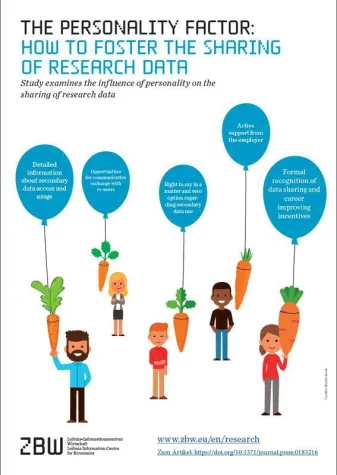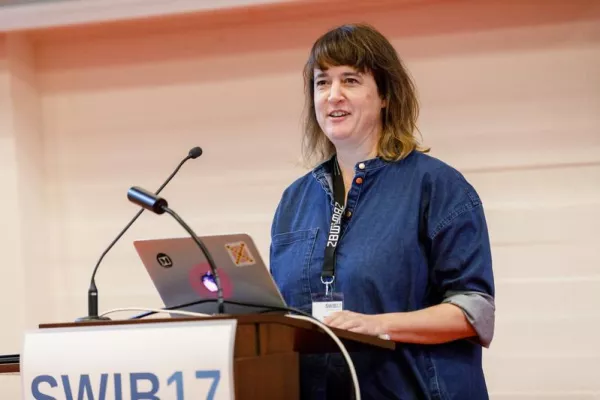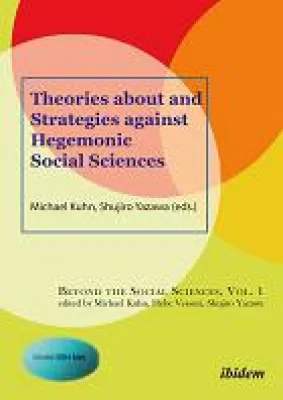(openPR) The sharing of research data presents a social dilemma. Although the sharing of research data offers great potential for scientific progress, researchers rarely practise it. A study of the ZBW – Leibniz Information Centre for Economics in cooperation with the Leibniz Research Alliance Science 2.0 looks at the role played by the personality of researchers within this social dilemma and which individual barriers and incentives should be taken into account.
---
The personality of a researcher can play an important part in his or her decision to share research data. This is the result of a national, interdisciplinary study with 1,564 respondents carried out by the ZBW – Leibniz Information Centre for Economics () within the framework of the Leibniz Research Alliance Science 2.0 and with the cooperation of the German Institute for Economic Research (DIW Berlin), the Alexander von Humboldt Institute for Internet and Society and the VU University Amsterdam.
The paper shows that, depending on the personality of a researcher, different incentives and barriers are given different priority.
Dr Stephanie B. Linek (), ZBW researcher and main author of the paper “Data Sharing as social dilemma” explains: in order to foster open sharing of research data it is important to address the researchers’ individual characteristics, to offer personal incentives and to remove subjective barriers.
The study of Linek et.al. (2017) is based on the Big Five Model of personality dimensions, i.e. (1) extraversion (tendency to be outgoing), (2) neuroticism (tendency to be sensitive and emotionally unstable), (3) openness (tendency to be curious and inventive), (4) agreeableness (tendency to be friendly, compassionate, and cooperative), and (5) conscientiousness (tendency to be self-disciplined and efficient). In addition, the personality dimensions of Machiavellianism (manipulative, selfish and instrumental nature) and social desirability were included as well as age and gender as sociodemographic control variables.
Linek et.al draw the following conclusions from their study:
• Researchers with a high conscientiousness set a high value on knowing the use their data will be put to and who will have access to them. Communication with secondary data users can provide incentives here. A similar result is found for the personality dimensions of extraversion and agreeableness. Secondary use therefore should be transparent and offer opportunities for exchange with the re-users of data.
• Scientists with high neuroticism who fear critique and falsification of data are more motivated by detailed information about concrete procedures of data sharing, restrictions on usage and specific usage agreements for secondary data. Having a say or veto option regarding secondary use of data could also be an attractive incentive.
• Active support from the employer is an important incentive to share data, especially for researchers with high openness and agreeableness.
• The findings for social desirability support the assumption of previous studies that publications are more important than scientific exchange through data sharing. Formal recognition of data sharing and corresponding career-improving incentives should be established.
• The findings for Machiavellianism on the one hand, and for gender differences on the other, also indicate that it is not only a question of establishing new conditions, but also of fairness and democratic use of existing possibilities (incentives and barriers).
The study was carried out in cooperation with the German Institute for Economic Research (DIW Berlin), the Alexander von Humboldt Institute for Internet and Society, and the VU University Amsterdam. It is a cooperative work within the framework of the Leibniz Research Alliance Science 2.0. ()
The paper:
Linek, S. B., Fecher, B., Friesike, S. & Hebing, M. (2017). Data sharing as social dilemma: influence of the researcher’s personality. PLoS ONE 12(8): e0183216. https://doi.org/10.1371/journal.pone.0183216
About the ZBW – Leibniz Information Centre for Economics:
The ZBW – Leibniz Information Centre for Economics is the world’s largest information centre for economic literature. The institution holds more than 4 million media items and enables access to millions of online documents in economics. In 2016 alone, 4 million digital full-texts were downloaded. In addition, the ZBW provides a fast-growing collection of Open Access documents. The repository EconStor currently gives free access to more than 128,000 articles and working papers. EconBiz, the portal for international economic information, allows students and researchers to search among ten million datasets. The ZBW edits two journals in economic policy, Wirtschaftsdienst and Intereconomics. The ZBW is a research-based academic library. Three professors and an international group of PhD candidates do transdisciplinary research on Science 2.0. Research at the ZBW is connected to international networks. The main co-operation partners are engaged in EU projects and in the Leibniz Research Alliance Science 2.0. The ZBW is a member of the Leibniz Association and a foundation under public law. In 2011, 2012 and 2013, the ZBW was honoured for its innovative library work with the international LIBER Award for Library Innovation. In 2014, the ZBW received the German “Library of the Year” award.
Press contact:
DR DOREEN SIEGFRIED
Press officer
ZBW – Leibniz Information Centre for Economics
Düsternbrooker Weg 120
24105 Kiel
T: +49 [0] 431. 88 14-455
F: +49 [0] 431. 88 14-520
M: +49 [0] 0172. 251 48 91
E:
Weitere Informationen:
- https://www.zbw.eu/en/
- https://www.zbw.eu/en/research/
- https://www.zbw.eu/en/about-us/key-activities/usability/stephanie-linek/
- http://www.leibniz-science20.de/
Quelle: idw










